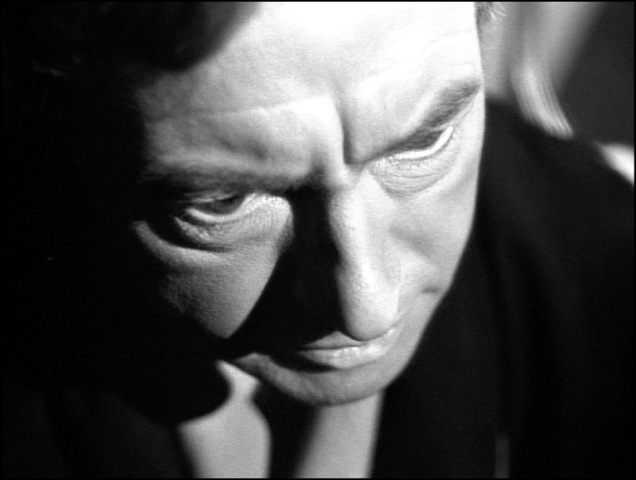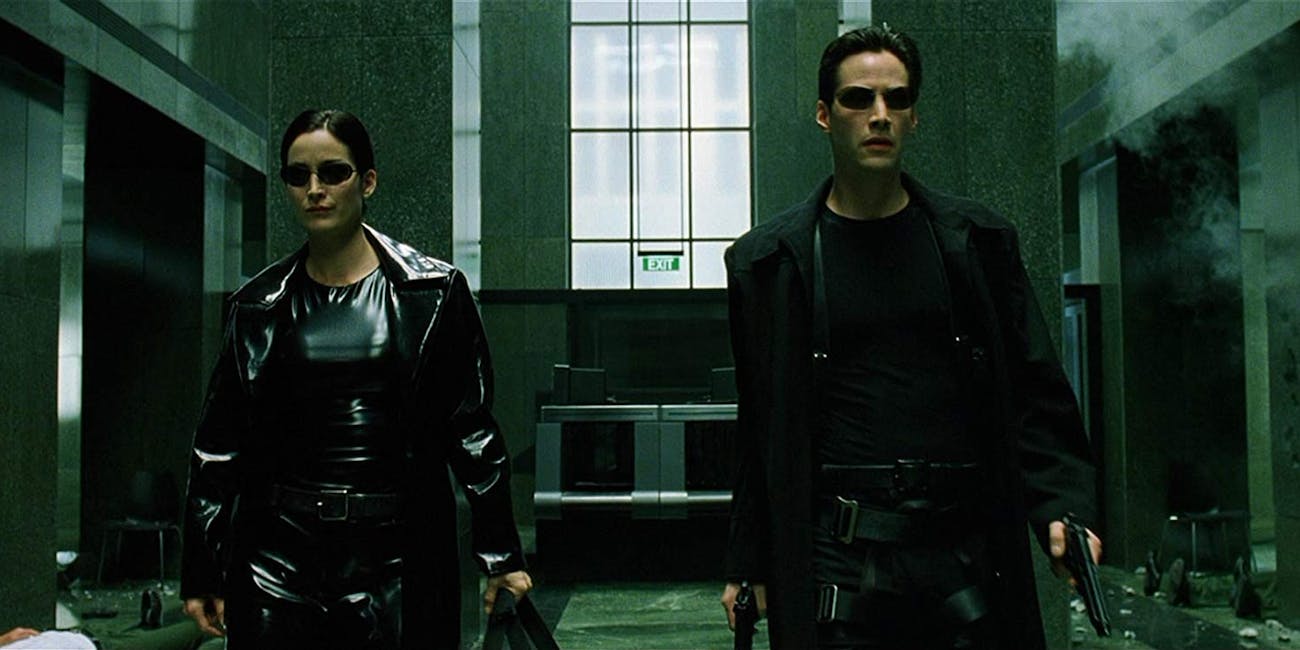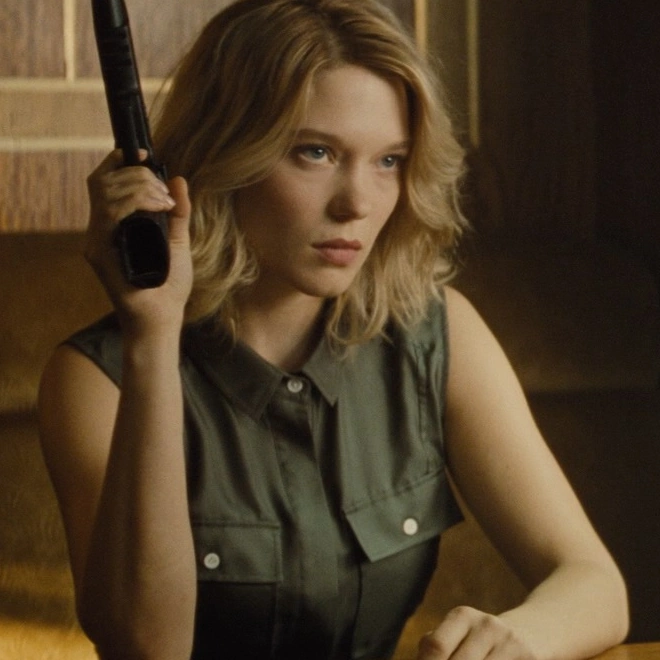Warning: If you haven't seen this film yet, this essay reveals important plot details including the ending.
Alfred Hitchcock's Notorious (1946) perfectly illustrates how Hitchcock's technical virtuosity served the story and themes of his films. It also showcases his couching of complex emotions and ideas in commercial Hollywood thrillers. On a plot level the film is about a woman who goes uncover to expose a Nazi plot. But the plot is secondary to the odd and twisted love triangle at the films' centre.
Alicia Huberman (Ingrid Bergman) is the daughter of a Nazi sympathizer who has been convicted of treason against the United States. An American spy named T.R. Devlin (Cary Grant) later appears at a party she is holding. The shot I always remember from Notorious is Devlin's introduction. He's in the foreground, shot from behind in shadow while Alicia in the mid-ground and her guests in the background are high-key lighted. He also doesn't speak.
This shot establishes Devlin as a mysterious outsider. As Hitchcock re-frames the shot Devlin is always off centre of frame, signifying something is off about him. Placing Devlin in shadow makes him appear devilish (Devlin/devil). He's not introduced as a hero but as someone more morally ambiguous and moral grayness is how Hitchcock parallels between Devlin and Alica.
The scene fades out and when it fade back in we get the back of Devlin's head again. The camera pulls back and to the right to provide a two-sbot of him and Alicia. Then we get the first close-up of Devlin's face. We're essentially introduced to Devlin twice, establishing the two sides of the character: the mysterious and interloper, and the charming and glamorous suitor who better befits the audience's image of Cary Grant.

Devlin approaches her with the mission of infiltrating the aforementioned group of Nazis who are hiding out in Brazil. Their leader is Alexander Sebastian (Claude Rains), a former friend of Alicia's father and who was in love with Alicia. Alicia initially refuses the assignment but Devlin plays her a recording of an argument between her and her father, in which he says she loves America and would never betray it. But why does Alicia go along with the mission. Is it due to love of country, because she's intrigued by Devlin, or is she searching for redemption? I think it's a combination of all these things, which makes her character all the more complex.
Devlin is cruel to Alicia at the beginning of the film, knocking her out after she was driving while inebriated, then later saying her new sobriety is just a phase. When they arrive in Rio they fall in love and he reveals his more humane side. But Devlin's superiors tell him the mission involves Alicia having to seduce Sebastian and he reverts back to being cold and mean towards Alicia. When she notices him being distant, she jokingly asks if he's actually married. He remarks she should be used to that by know. Alicia rightly says it's always "right below the belt" with him.
Devlin's snide and vicious remarks are clearly a front. From the film's beginning he's been attracted to Alicia. He's a spy and she's a the daughter of a traitor. She also a drinking problem and is a "loose woman." He hates he has feelings for someone with this background.. As a spy he's supposed to have no emotional attachments. He lets his guard down for a while and gives in to his feelings. He then becomes jealous of Alicia being with another man. It also gives him an excuse to revert back to his down-to-business, heartless persona.
She "accidentally" meets up with Sebastian and they begin a relationship, with Sebastian eventually asking Alicia to marry him. What fascinates me about the love triangle is the man who's the villain- Sebastian- treats Alicia better than Devlin, whom we expect to be the romantic hero. Rains was nominated for Best Supporting Actor at the Oscars and the quality I think makes his performance great is he doesn't play Sebastian as a villain. Rains is-as Hitchcock said in the famous interview between him and Francois Truffaut- "an appealing fellow," whose "love for Ingrid Bergman is probably deeper than Cary Grant's."
Sebastian discovers Alicia and begins to poison her. The film has already set up Sebastian's partners will eliminate their own for just a minor mistake. Emil Hupka (Eberhand Krumschmidt) reacted strangely to a bottle of wine- we later learn some of the wine bottles contain uranium ore, which is an ingredient for building atom bombs. This is was enough for Hupka to be killed. There's no way Sebastian will live if his dangerous blunder is discovered. One of Hitchcock's great abilities as a storyteller was making the audience empathize with villains or morally grey characters. We can feel genuine suspense regarding the situation in which Sebastian finds himself.
I love that when Sebastian tells his mother Madame Sebastian (Leopoldine Konstantin). "I've married and American agent," Hitchcock shoots him slightly from above, heightening the intensity of this moment. Sebastian looks ominous, foreshadowing the drastic choice he will make. I feel Madame Sebastian is the real villain of the film, the one who has the most control over Sebastian and whom comes up with the poisoning plot..
But can we talk about Ingrid Bergman? I'd argue Bergman is the greatest screen actress of all time. She could say so much without dialogue, suggesting pain and joy, often in the same scene. And not many actresses could be both glamorous and gritty. Alicia has to be alluring while also having negative qualities- someone who pursues redemption throughout the film. Redemption is one of the film's major themes. As already mentioned, Alicia is looking for redemption due to her father's Nazi sympathies.
Cary Grant is often undervalued as an actor. I think this largely because he's thought of a movie star. But this was an actor who play light comedy and dark drama. Like Bergman, Grant plays a lot of Devlin's emotions without speaking. Hitchcock needed an actor who the audience would be willing to forgive for his treatment of Alicia and Grant in this film is someone the audience wants to like because they like him in other films. There's something cathartic in him admitting he was "a fat headed guy full of pain." He finally does something heroic by saving Alicia, receiving his own form of redemption.
Paul Duncan points out in his book on Hitchcock, Sebastian even helps Devlin save her. But he is not redeemed but left to die at the hands of his own people. The film's writer Ben Hecht hated the Nazis so he doesn't give Sebastian any reprieve. The morality of the film is very clear in this regard.
Hecht's Oscar-nominated screenplay is a study in economy, giving us enough information to understand the plot and characters without excessive exposition or set-up. This befits Hitchcock's own efficient style since he believed in what he called "pure cinema," telling the story completely through the language of cinema. And we can't discuss the filmmaking of Notorious without mentioning the famous crane shot that goes from the top of a staircase to a close-up of the wine cellar key that Alicia has stolen. When Peter Bogdanovich asked Hitchcock in a 1963 interview how the idea for the crane shot came about, Hitchcock said:
"That's again using the visual. That's a statement which says, "In this crowded atmosphere there is a very vital item, the crux of everything." So taking that sentence, as it is, in this crowded atmosphere, you go to the widest possible expression of that phrase and then you come down to the most vital thing-- a tiny key in the hand. That's merely the visual expression to say, "Everybody is having a good time, but they don't realize there is a big drama going on here." And that big drama epitomizes itself in a little key."
Again, visual storytelling. Without dialogue we understand the idea Hitchcock is communicating. It was a difficult shot to achieve but it appears elegant and seamless.
The other famous shot in the film is the infamous kiss between Alicia and Devlin. Kisses were not allowed to last more than three seconds per the Hays Code. Hitchcock's way of getting around the restrictions was having Devlin and Alicia kiss, then talk, then kiss again, so they end up kissing for about three minutes. I would argue the restrictions ended up making the scene even sexier. The scene done in one shot deepens the intimacy, making us feel we're spying on private moments between two lovers. Cinema as a form of voyeurism is an idea prevalent in Hitchcock's ouevre- Rear Window and Vertigo being prime examples. And like those films Notorious is about the literal act of spying on people. Devlin goes from spying on Alicia to becoming her lover. This is similar to Scottie Ferguson (James Stewart) falling for Madeleine (Kim Novak) in Vertigo. Alicia has to become intimate with Sebastian to spy on him, expect she doesn't have romantic or sexual feelings towards Sebastian, making their relationship purposely unerotic when contrasted with her's and Devlin's
Professor Drew Casper, in his commentary for the film, says romance for Hitchcock is "a matter of suspense and thrills." This conflation may best sum up not only Notorious but many of Hitchcock's other films. It's also noted by Professor Leonard Leff onthe making of documentary on the MGM DVD, that Hitchcock creates a "kind of erotic suspense," due to our knowledge of what will happen between Devlin and Alicia.
This is one of Hitchcock's great films, elegant but rough, dark but hopeful, romantic and perverse, or perhaps perversely romantic. It's a film that I would show to someone who's never seen a Hitchcock film to illustrate why he's brilliant filmmaker. Notorious has risen in my estimation on recent re-watch. I don't know how much I liked upon first viewing but I appreciate the film more now and have really come to love it. I think it was Devlin's treatment of Alicia which made the film difficult to embrace but that aspect of the film can't be separated the story's theme. Notorious is largely about the emotional and physical abuse Alicia goes through.
Alicia comes out the other side not unscathed but alive which gives the a sense of triumph, punctuated by Sebastian's implied death and Devlin's romantic admittance. It's these themes that make Notorious not just an entertaining spy thriller but a human drama which more than 70 years later is just as provocative, beautiful and sexy as ever.

























